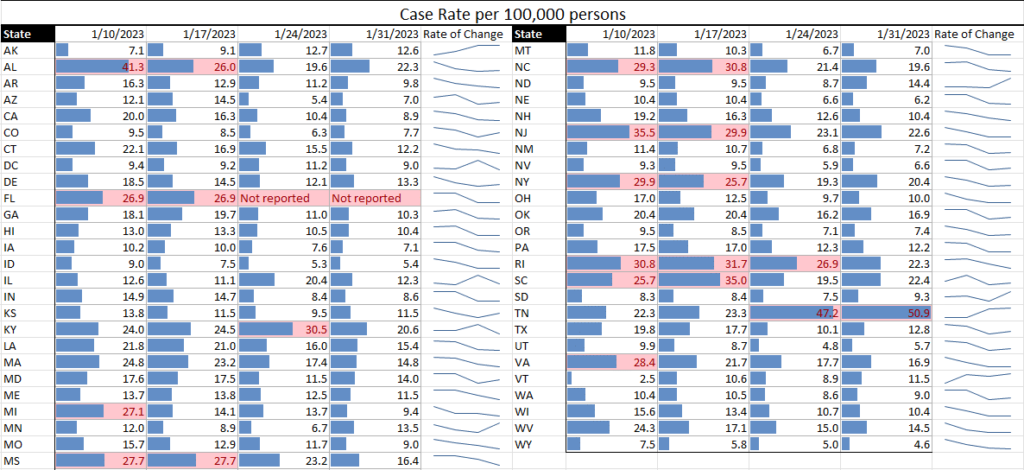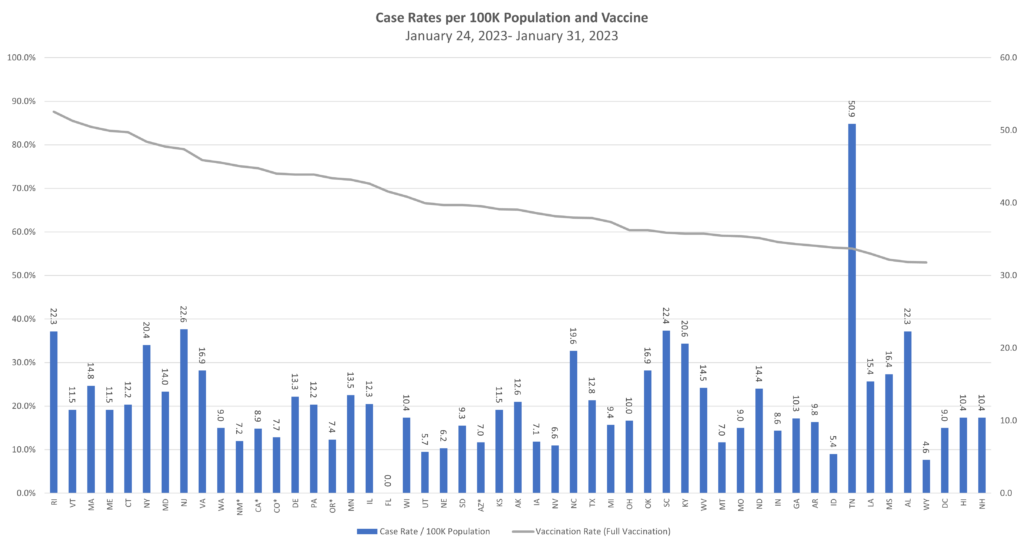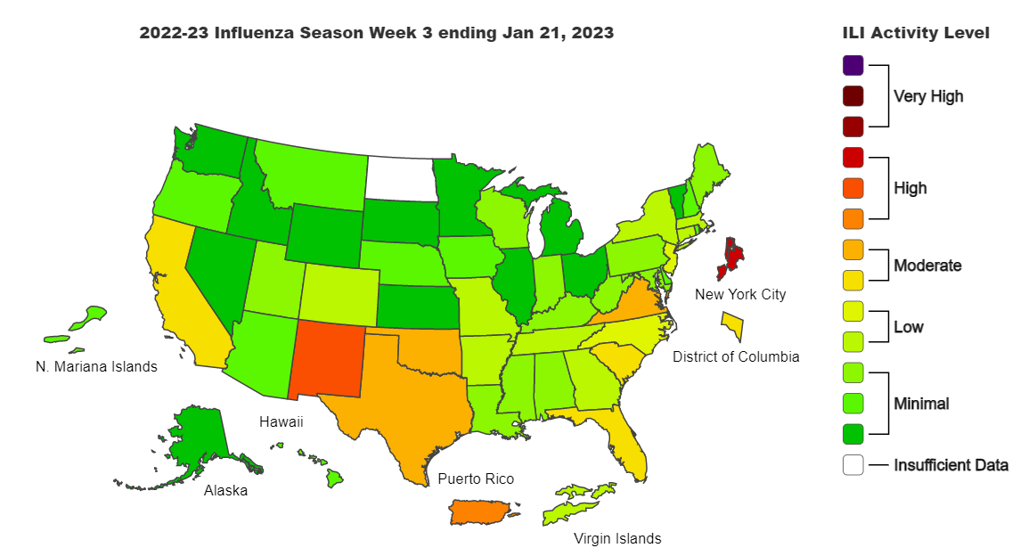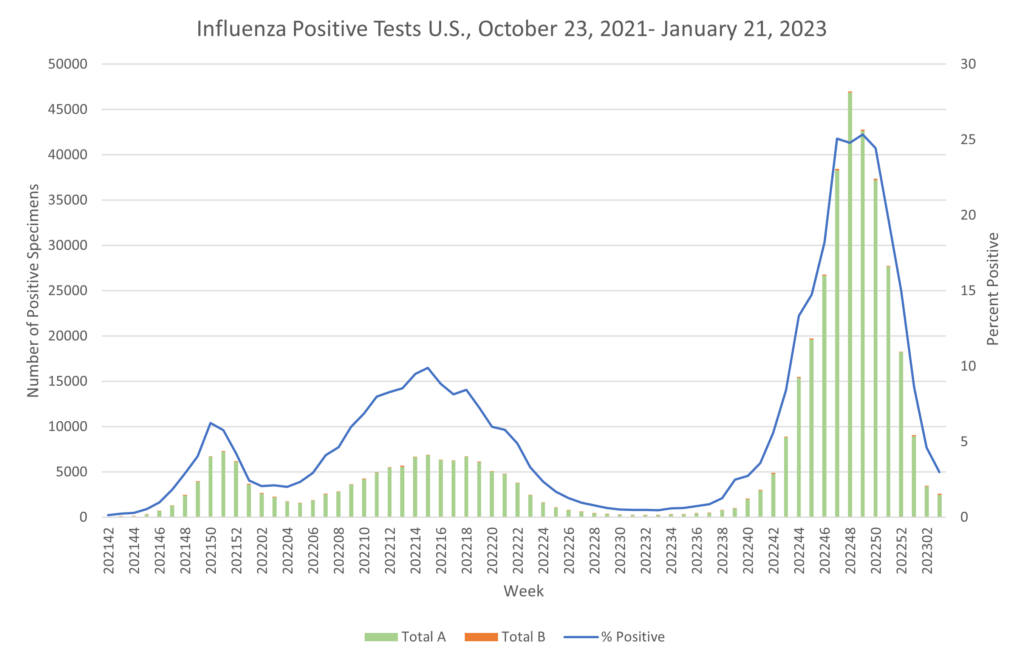As we, once again, see declining case rates of RSV, influenza and COVID, we remain optimistic about their continuing downward trends. In fact, COVID has decreased far enough in the U.S. that the Biden Administration announced the May expiration of COVID as a public health emergency – although the WHO is continuing to consider COVID as constituting a public health emergency of international concern (PHEIC).
At the same time, reports of newly discovered animal vectors for H5N1 remind us that there is always the potential of viral transmission through animal reservoirs. The latest was the concerning outbreak of bird flu at a mink farm in Spain. While none of the farm workers had become infected, there is fear that it could give the H5N1 strain opportunities to evolve and adapt to mammals, including humans. Prior to this, it had only been known to spread from birds to animals, not between mammals.
While TAG does not see this as something to significantly worry about at this time, it is something of which businesses should be aware – and is a reminder that there is always a risk of emerging flu types.
The COVID pandemic made society much more aware of the need for personal hygiene and distancing from infected persons to help reduce spread of infectious diseases. While COVID, RSV, and flu are declining, it is likely that the decrease is at least somewhat due to society’s and businesses’ continuing use of such protections. And the continued decline, and reduced transmission of emerging diseases, will continue to be dependent on these.
COVID Risk Matrix:



Influenza:


Infectious Disease News
- A recent scientific study, suggesting that an outbreak of H5N1 avian flu in October 2022, on a Spanish mink farm stemmed from wild birds, is causing global alarm. This is the first time that a virus jump from birds to mammals has been detected in Europe.
- Biden administration plans to end COVID public health emergency in May. “The COVID-19 national emergency and public health emergency (PHE) were declared by the Trump Administration in 2020. They are currently set to expire on March 1 and April 11, respectively. At present, the Administration’s plan is to extend the emergency declarations to May 11, and then end both emergencies on that date,” the Office of Management and Budget.
- Measles. Among many reports of rising measles cases, vaccination campaigns are about to start in India. In December 2022, the Ministry of Health South Sudan declared an outbreak of measles. To date, 3,581 suspected measles cases have been reported, including 41 deaths in the country. Measles vaccination coverage rates have remained low and reached only 69% in 2021. Indonesia saw 32 times more measles cases in 2022 than the year before, amid a slump in routine pediatric immunizations blamed on the COVID-19 pandemic.
- In the U.S., the CDC reports that vaccination rates among kindergarteners are high, but coverage for the 2021-2022 school year dropped to 93 percent compared to 95 percent for the 2019-2020 school year. This likely contributed to the recent outbreak detected in Ohio, that has spilled over to Kentucky as well where 1 case has been reported. To achieve “herd immunity,” it is recommended that a target of 95% of two doses of the measles containing vaccine among the population would be effective.
- Norovirus. The Kerala (India) Health Department on January 24 confirmed two cases of the gastrointestinal infection norovirus in class 1 students in Ernakulam district. The two samples were tested after 62 persons — students and their parents — developed symptoms such as diarrhea, abdominal pain, vomiting, nausea, a high temperature, headache, and body aches. A diarrhea epidemic on Santa Catarina Island, Brazil, has affected more than 3,200 people and has been linked to norovirus. The likely source is contaminated water.
- TB. Close contacts of individual cases of tuberculosis (TB) at 2 schools in Pennsylvania and Las Vegas have been advised of their possible risk and have been offered testing. With reports of increasing TB cases around the world, the WHO stated, “We believe the TB field will benefit from similar high-level coordination.” To support the rationale for immediate action, the WHO commissioned an investment case study in 2022 for new TB vaccines.





